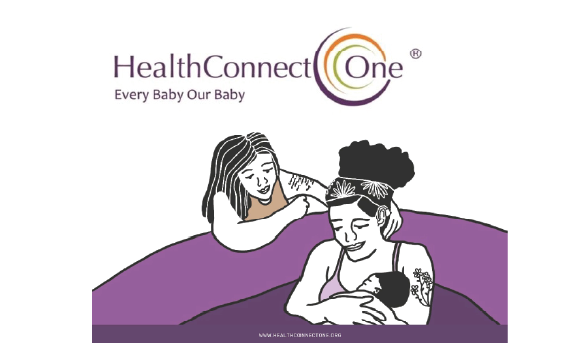By Nurture Connection
Birth workers, also called birth doulas, can make a difference in the health outcomes for pregnant, laboring, and postpartum parents and their newborns. This support is especially vital for Black, Brown, and Indigenous communities.
For a wealthy nation, the United States is a dangerous place to be born. But it’s not equally risky for all: Research has consistently found that Black mothers and babies have the worst childbirth outcomes here. Black women have the highest maternal mortality rate in the United States, almost three times the rate for white women. That holds true regardless of socioeconomic status.
That’s why organizations like HealthConnect One are crucial. The organization provides training, research, advocacy, and education for community birth workers who serve Black, Brown, and Indigenous communities. HealthConnect One is engaged in advancing equitable, community-based, peer-to-peer support for pregnancy, birth, breastfeeding, and early parenting. Trained childbirth companions provide emotional support, physical comfort, education, and advocacy to women and birthing persons. These birth workers can reduce medical interventions (including C-sections), improve personal satisfaction and mood around the birth experience, and increase success with newborn nurturing, in particular breastfeeding. Early Relational Health (ERH) is fundamental to HealthConnect One’s mission.
Find out more about the work of this national organization and its recent partnership with Nurture Connection and the Center for the Study of Social Policy in this video discussion on the importance of doulas for communities of color and their pivotal role in advancing Early Relational Health.
Panelists from HealthConnect One and community birth doulas discussed the benefits of birth workers and the challenges they face. Topics touched on include everything from insurance reimbursement for services and fair pay for workers to training and retaining these advocates and occupational hazards such as compassion fatigue and secondary trauma. Doulas also discussed the need to educate both the BIPOC community and the hospital system about the value that doulas bring to the birth experience and beyond.
Birth support is instinctual, ancestral, and shared within community, say these panelists. As long as someone has been pushing out a baby, there has been someone on hand to help, notes HealthConnect One’s CEO and president, Dr. Twylla Dillion, who says it’s natural for Black, Brown, and Indigenous communities to be together and support each other in times of need. It’s also true that these same communities have faced a long history of disinvestment, intentional harm, division, separation, incarceration, and oppression, which has caused a lot of damage and stripped away at community cohesion. HealthConnect One seeks to help build on birth support tools and skills that are already in the community and reduce barriers to their success.
Dr. Dillion adds that it’s critical that birthing people who want to engage the services of a doula have the access to such resources. It’s also key that in BIPOC communities, birth workers look and talk like the women they serve and live in the same neighborhoods. This helps to build trust and rapport, she explains, adding that birth doulas with their own babies can also model closeness and Early Relational Health in a very intentional way.
Case in point: Robena Hill, both a birth doula and mother on the panel with a former client, Renee Perkins, a mother of four and a recent doula training graduate. Perkins talked about how necessary Hill was in advocating for Perkins when she was not in a position to advocate for herself during a traumatic birth. Perkins also noted the invaluable assistance of doulas that new moms appreciate, including having someone help with everything from ensuring a newborn is latching on and holding a baby to putting in a load of laundry and stirring a pot of soup on the stove.
Listen in to learn more about doulas, the need to nurture the nurturers (birth work is a high-stress, high-burnout, low-retention field), and how Early Relational Health plays a key role in any birth worker’s repertoire.
This blog post is part of Nurture Connection’s “ERH in Action” series of listening and learning sessions. Our network is full of meaningful examples of people and organizations promoting ERH in their daily lives and work. Our “ERH in Action” series highlights and uplifts stories from various fields to share learnings, challenges, and bright spots in the movement.
Learn more about birth workers from our recent report, Community-Based Doulas and Early Relational Health: The Role of Public Policy and Financing.
